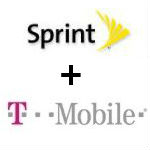 Rumors continue to circle around the possibility of a Sprint and T-Mobile merger, accompanied with the usual speculation: How would such a merger benefit each company? What is its likelihood of gaining approval? How would the wireless market be impacted?
Rumors continue to circle around the possibility of a Sprint and T-Mobile merger, accompanied with the usual speculation: How would such a merger benefit each company? What is its likelihood of gaining approval? How would the wireless market be impacted?
Perhaps what is most remarkable about this particular potential wireless merger is that, unlike with other recent real and rumored wireless carrier pairings, it isn’t primarily about spectrum – a motivation that has driven carriers to make acquisitions which otherwise might have seemed poor choices.
Spectrum was a key driver behind T-Mobile’s acquisition of MetroPCS, a company that had struggled to compete in a crowded wireless marketplace.
Spectrum also was an important factor in Sprint’s acquisition of Clearwire – a company with few customers that deployed technology that lost out in the marketplace. And Sprint bought U.S. Cellular holdings in certain markets because it wanted the spectrum – paying an attractive price even though the markets were unprofitable for U.S. Cellular.
Nowadays both T-Mobile and Sprint have healthy spectrum holdings in lower-frequency as well as higher-frequency bands. Sprint acquired huge spectrum holdings through its Clearwire purchase. And T-Mobile recently shored up its position with its purchase of 700 MHz spectrum from Verizon.
Ironically what is most extraordinary about a potential Sprint/ T-Mobile merger is how ordinary the motivation behind it would be. Sprint has compelling plans to deploy ultra-high-speed mobile broadband service but in the meantime is bleeding subscribers as the performance of its current network has not kept pace with that of other carriers. T-Mobile, on the other hand, has been making major competitive inroads with an aggressive new marketing strategy, but would welcome the greater scale a merger with Sprint would provide.
Unlike with other recent wireless M&A, the motivating forces are not unique to the wireless industry.
The solid spectrum position that a combined Sprint/ T-Mobile would have could be the merger’s undoing however. As financial research firm Moffett Nathanson Research pointed out recently the merged company would own an average of 291 MHz of spectrum in the nation’s top 100 markets – more than twice as much as Verizon or AT&T.
And it’s difficult to envision that sort of spectrum position passing regulatory scrutiny.

